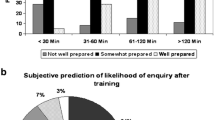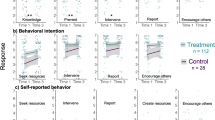Abstract
Two studies examined the immediate and longer-term impact of specialist training on sexual assault investigators’ use of best-practice questions and relationship evidence. Investigators completed mock suspect interviews immediately and 9–12 months following a 4-week specialist course that concentrated on the Whole Story approach to sexual offence investigations. The training had an immediate positive impact on investigators’ use of non-sexual grooming details, and a long-term positive impact on investigators’ use of relationship details. It also increased the use of open questions and decreased the use of specific questions, with performance sustained for open-depth questions and specific yes/no questions. Specialist training can improve investigators’ ability to adopt a narrative interviewing approach and ask about relationship details, yet skill erosion remains an issue that future training programs need to address. Incorporating relationship evidence into investigative interviews in an open-ended manner may be a key strategy for improving understandings about victim-offender dynamics in sexual offence cases, which could have implications for attrition and conviction rates.

Similar content being viewed by others
Data Availability
The datasets generated during and/or analysed during the current study are available from the corresponding author on reasonable request.
Notes
The PEACE model is an approach to investigative interviews that includes five stages: planning and preparation, engage and explain, account and clarification, closure, and evaluation (see Griffiths and Milne 2006 for a more detailed overview).
When Mauchly’s test of sphericity indicated that sphericity was violated, the appropriate correction (Huynh–Feldt or Greenhouse–Geisser) was applied to the degrees of freedom.
References
Bennett N, O’Donohue W (2014) The construct of grooming in child sexual abuse: conceptual and measurement Issues. J Child Sex Abus 23(8):957–976. https://doi.org/10.1080/10538712.2014.960632
Benson MS, Powell MB (2015) Evaluation of a comprehensive interactive training system for investigative interviewers of children. Psychol Public Policy Law 21(3):309–322. https://doi.org/10.1037/law0000052
Brown JM, Hamilton C, O’Neill D (2007) Characteristics associated with rape attrition and the role played by scepticism or legal rationality by investigators and prosecutors. Psychol Crime Law 13(4):355–370. https://doi.org/10.1080/10683160601060507
Bunting L (2008) Sexual offences against children: an exploration of attrition in the Northern Ireland criminal justice system. Child Abuse Negl 32:1109–1118. https://doi.org/10.1016/j.chiabu.2008.09.002
Craven S, Brown S, Gilchrist E (2006) Sexual grooming of children: review of literature and theoretical considerations. J Sex Aggress 12:287–299. https://doi.org/10.1080/13552600601069414
Cyr M, Lamb ME (2009) Assessing the effectiveness of the NICHD investigative interview protocol when interviewing French-speaking alleged victims of child sexual abuse in Quebec. Child Abuse Negl 33:257–268. https://doi.org/10.1016/j.chiabu.2008.04.002
Daly K, Bouhours B (2010) Rape and attrition in the legal process: a comparative analysis of five countries. Crime Justice 39(1):565–650
Dando C, Wilcock R, Milne R (2009) The cognitive interview: novice police officers’ witness/victim interviewing practices. Psychol Crime Law 15:679–696. https://doi.org/10.1080/10683160802203963
Darwinkel E, Powell M, Tidmarsh P (2013) Improving police officers’ perceptions of sexual offending through intensive training. Crim Justice Behav 40:895–908. https://doi.org/10.1177/0093854813475348
Darwinkel E, Powell M, Tidmarsh P (2014) Prosecutors’ perceptions of the utility of ‘relationship’ evidence in sexual abuse trials. Aust N Z J Criminol 47:44–58. https://doi.org/10.1177/0004865813497733
Fisher RP, Geiselman RE (1992) Memory-enhancing techniques for investigative interviewing: The cognitive interview. Charles C Thomas Publisher, Springfield, England
Fitzgerald J (2006) The attrition of sexual offences from the New South Wales criminal justice system. Bureau of Crime Statistics and Research, NSW
Gillespie A (2002) Child protection on the internet—challenges for criminal law. Child Fam Law Q 14:411–425
Griffiths A, Milne R (2006) Will it all end in tiers? Police interviews with suspects in Britain. In Williamson, T. (Ed.) Investigative Interviewing. Rights, Research, regulation (pp. 167–189). London: Willan Publishing
Hansen NB, Hansen M, Campbell R, Elklit A, Hansen OI, Bramsen RH (2019) Are rape cases closed because of rape stereotypes? Results from a Danish police district. Nord Psychol 71(1):51–61. https://doi.org/10.1080/19012276.2018.1470552
Kelly L, Lovett J, Regan R (2005). Gap or chasm? Attrition in reported rape cases. (Report No. 293). London: Home Office Research, Development and Statistics Directorate
Lamb ME, Hershkowitz I, Sternberg KJ, Esplin PW, Hovav M, Manor T, Yudilevitch L (1996) Effects of investigative utterance types on Israeli children’s responses. Int J Behav Dev 19:627–638. https://doi.org/10.1080/016502596385721
Lamb ME, Orbach Y, Hershkowitz I, Esplin PW, Horowitz D (2007a) A structured forensic interview protocol improves the quality and informativeness of investigative interviews with children: a review of research using the NICHD Investigative Interview Protocol. Child Abuse Negl 31:1201–1231. https://doi.org/10.1016/j.chiabu.2007.03.021
Lamb ME, Orbach Y, Hershkowitz I, Horowitz D, Abbott CB (2007b) Does the type of prompt affect the accuracy of information provided by alleged victims of abuse in forensic interviews? Appl Cogn Psychol 21:1117–1130. https://doi.org/10.1002/acp.1318
Lamb ME, Sternberg KJ, Orbach Y, Hershkowitz I, Horowitz D, Esplin PW (2002) The effects of intensive training and ongoing supervision on the quality of investigative interviews with alleged sex abuse victims. Appl Dev Sci 6:114–125. https://doi.org/10.1207/S1532480XADS0603_2
Milne R, Bull R (1999) Invest Interviewing: Psychol Pract. Wiley, Chichester
Ministry of Justice (2011) Achieving best evidence in criminal proceedings. United Kingdom. https://www.cps.gov.uk/sites/default/files/documents/legal_guidance/best_evidence_in_criminal_proceedings.pdf
Multon K, Coleman JSM (2018) Inter-Rater Reliability, In: Frey BB (ed) The SAGE encyclopedia of educational research, measurement, and evaluation. Thousand Oakes: Sage Publications. https://doi.org/10.4135/9781506326139
Myklebust T, Bjørklund RA (2006) The effect of long-term training on police officers’ use of open and closed questions in field investigative interviews of children (FIIC). J Investig Psychol Offender Profiling 3:165–181. https://doi.org/10.1002/jip.52
Oxburgh GE, Myklebust T, Grant T (2010) The question of question types in police interviews: a review of the literature from a psychological and linguistic perspective. Int J Speech Lang Law 17(1):45–66. https://doi.org/10.1558/ijsll.v17i1.45
Pennington N, Hastie R (1991) A cognitive theory of juror decision making: the story model. Cardozo Law Rev 13(2–3):519–557
Powell MB, Fisher RP, Wright R (2005) Investigative interviewing. In: Brewer N, Williams K (eds) Psychology and law: An empirical perspective. New York: Guilford
Powell MB, Guadagno B, Benson M (2014) Improving child investigative interviewer performance through computer-based learning activities. Policing Soc. An International Journal of Research and Policy 26(4):365–374. https://doi.org/10.1080/10439463.2014.942850
Powell MB, Snow PC (2007) Guide to questioning children during the free-narrative phase of an investigative interview. Aust Psychol 42:57–65. https://doi.org/10.1080/00050060600976032
Powell MB, Wright R, Clark S (2010) Improving the competency of police officers in conducting investigative interviews with children. Police Pract Res Int J 11:211–226. https://doi.org/10.1080/15614260902830070
Price HL, Roberts KP (2011) The effects of an intensive training and feedback program on police and social workers’ investigative interviews of children. Can J Behav Sci 43:235–244. https://doi.org/10.1037/a0022541
Smith RM, Powell MB, Lum J (2009) The relationship between job status, interviewing experience, gender, and police officers’ adherence to open-ended questions. Leg Criminol Psychol 14:51–63. https://doi.org/10.1348/135532507X262360
Tidmarsh P, Powell M, Darwinkel E (2012) Whole story: a new framework for conducting investigative interviews about sexual assault. II-RP Journal 4(2):35–44
Tidmarsh P, Sharman S, and Hamilton G (2021) Police officers’ perceptions of specialist training, skills and qualities needed to investigate sexual crime. Police Pract Res 22(1):475-490
Waterhouse GF, Reynolds A, Egan V (2016) Myths and legends: the reality of rape offences reported to a UK police force. Eur J Psychol Appl to Leg Context 8(1):1–10. https://doi.org/10.1016/j.ejpal.2015.04.001
Westera N, Kebbell M (2014) Investigative interviewing in suspected sex offences. In: Bull R (eds) Investigative Interviewing. Springer, New York, NY. https://doi.org/10.1007/978-1-4614-9642-7_1
Winters GM, Jeglic EL (2017) Stages of sexual grooming: Recognizing potentially predatory behaviors of child molesters. Deviant Behav 38(6):724–733. https://doi.org/10.1080/01639625.2016.1197656
Acknowledgements
Thank you to Dr. Elli Darwinkel for help with coding.
Author information
Authors and Affiliations
Corresponding author
Ethics declarations
Ethics Approval
Ethics approval was granted by Deakin University and Victoria Police ethics committees.
Consent to Participate
Informed consent was obtained from all individual participants included in the study.
Consent for Publication
Participants provided informed consent for their aggregated data to be published. There are not identifying details of participants included in this manuscript.
Conflict of Interest
The authors declare no competing interests.
Additional information
Publisher's Note
Springer Nature remains neutral with regard to jurisdictional claims in published maps and institutional affiliations.
Rights and permissions
About this article
Cite this article
Tidmarsh, P., Sharman, S. & Hamilton, G. The Effect of Specialist Training on Sexual Assault Investigators’ Questioning and Use of Relationship Evidence. J Police Crim Psych 38, 318–327 (2023). https://doi.org/10.1007/s11896-021-09446-x
Accepted:
Published:
Issue Date:
DOI: https://doi.org/10.1007/s11896-021-09446-x




